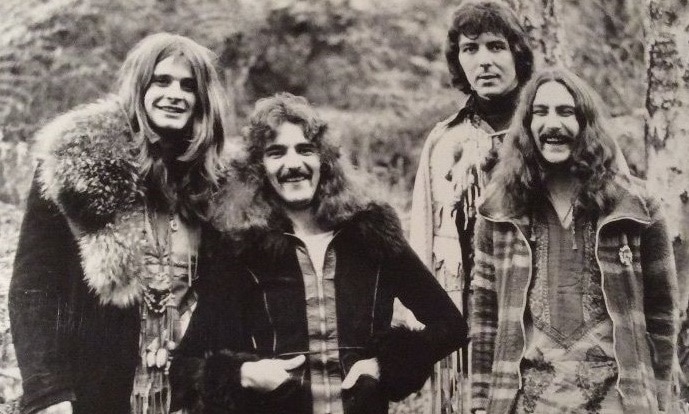Black Sabbath bassist and founding member Geezer Butler reflected on the band’s drastic change of style halfway through their original Ozzy Osbourne era. As Butler claims, the change had to do with the band’s legal and financial struggles from back in the day.
Speaking to Mike Brunn in The Rock Experience with Mike Brunn, Geezer explained that these unwanted legal strains were coupled with the band members “running out of ideas.” The bassist was asked if he felt like the band was becoming more of a “follower as opposed to a trendsetter” in their earliest days, and he replied (transcript via Ultimate Guitar):
“I think we were running out of ideas. I think what caused it was when we found out we were being ripped off so badly. We’ve done all these massive tours, sold millions and millions of albums, and we had nothing in the bank to show, for it was all gone.”
“The lowest point came when the taxman sent us a bill for all this money that we’ve never seen, then we had to put everything into paying back taxes for money that we’ve never seen. So I think it just wore the band down. And trying to get away from the management we had to go through…”
Getting more into the matter, Geezer also looked back on Sabbath’s 6th album “Sabotage.” The record’s title, as he explains, reflected on the things that were going on for the band at the time. And although Sabbath was changing as time went by, you could notice a significant shift with this record. He said:
“When we were doing the ‘Sabotage’ the album, which is why we call it sabotage, because lawyers coming into the studio every day, and we’ve been subpoenaed for this, and subpoenaed for that, and sued for this, and sued for that. It’s just destroyed us, and I think the music started to suffer.”
Apart from that, Geezer also pointed out that Warner Bros., their label, began favoring other bands over them, particularly the bands who were opening for Sabbath:
“And a lot of the bands that were supporting us were a lot more melodic, like Boston, known for like selling loads of albums. Warner Brothers sort of lost interest in us, they were promoting Van Halen.”
As a result, things just felt very discouraging and confusing, especially with the variety of styles that emerged during the 1970s. He continued:
“We were just sort of confused about what direction to go in. I think when punk came along, it brought back the rawness and the hard-hitting lyrics that we were sort of losing.”
“There was nobody in the band to say ‘Right, this is the direction we’re gonna go in. Let’s do that.’ And it was like we were all confused. Each one of us was like ‘Well, what direction do we go in now?’ That’s what led to the breakup.”
After “Sabotage,” Black Sabbath released two more records before breaking up. 1976’s “Technical Ecstasy” brought an even more drastic change of style. Meanwhile, 1978’s “Never Say Die!” not only marked the final studio album featuring all original members but its material was entirely ignored over the years, apart from the tour in support of it. Both “Technical Ecstasy” and “Never Say Die!” have traditionally been looked down upon by both the critics and fans.
During the chat, Geezer was also asked about this odd period Black Sabbath had after the “Technical Ecstasy” album. Apart from Ozzy being out for a few months and replaced by Dave Walker, Geezer also revealed in his new autobiographical book that he was fired for about a couple of weeks. During that time, it turns out that he and Ozzy discussed doing something on their own. Asked to elaborate on this, Geezer replied:
“Yeah, it’s just me and Ozzy, thinking what we’re going to do. Because we weren’t happy with the Sabbath situation at the time. We didn’t have any money in the bank. We were just thinking ‘Well, we’ve done all these tours and sold all these albums, and there’s nothing to show for it. So what’s the point in going on?'”
“We were just talking about, maybe doing something. Me and him together, just something different to get away from the chaos that was Sabbath at the time. But he went his own way, and I went back to Sabbath.”
In 1979, Ozzy was officially fired from the band. This was a difficult decision for Sabbath, especially knowing how memorable Ozzy was as the band’s frontman. Tony Iommi, Geezer Butler, and Bill Ward ended up getting a new singer — Ronnie James Dio, previously known for his work with Rainbow.
However, the 1980s ended up being a very turbulent decade for Black Sabbath and, at some point, Tony remained the sole original member of the band. The band went through countless lineup changes, even including Ian Gillan of Deep Purple on the vocals at one point.
While the albums from the 1980s and the early 1990s have some fan following, they are mostly forgotten in the band’s body of work, particularly the records featuring Tony Martin on vocals. It wasn’t until 2013 that original members, but without drummer Bill Ward, ended up releasing a new album, titled “13.”
Photos: Premier (Black Sabbath, original lineup (1973))


